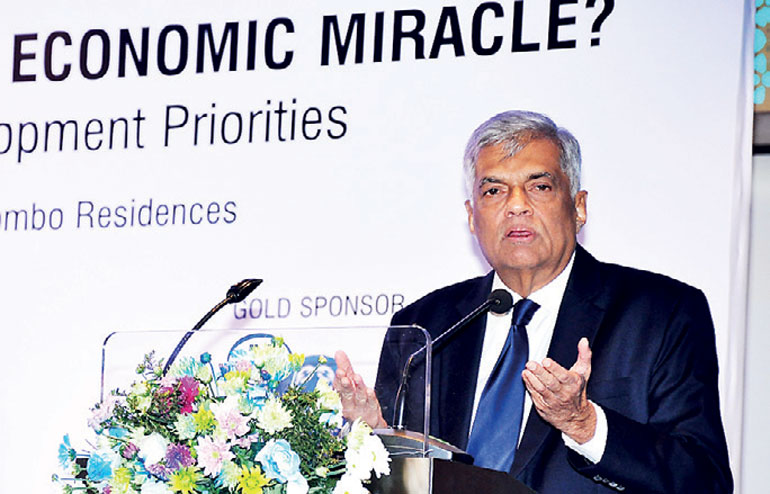Thursday Feb 19, 2026
Thursday Feb 19, 2026
Thursday, 20 July 2017 00:23 - - {{hitsCtrl.values.hits}}

Prime Minister Ranil Wickremesinghe – Pic by Lasantha Kumara
By Uditha Jayasinghe
Prime Minister Ranil Wickremesinghe yesterday called on the private sector to prepare for a new wave of liberalisation linked to Budget 2018 and a fresh three-year economic policy framework to be rolled out in the next couple of months.
Giving the keynote address at a conference organised by the European Chamber of Commerce in partnership with the Delegation of the European Union to Sri Lanka titled ‘Sri Lanka – The Next Economic Miracle?’ Wickremesinghe was stringent in his message to the private sector but also said the Government would work to provide a business-friendly environment to exporters.
“Now you must become competitive. I know there are regulations in the Government that make it difficult, there are barriers to trade, to productivity, but the Finance Minister, International Trade Minister and I are taking another look at this so that by the next Budget there will be another round of liberalisation.”
“I hope to make a new statement on economic policy followed by the Budget. Another opportunity for you will be the new Foreign Exchange Act. But is the private sector prepared? They have to get ready; they have to talk to banks about funding, you have to think about competitiveness and productivity. This is what we have to focus on,” he said.
The Premier advocated stronger growth in salaries to increase labour force productivity, pointing out that if the private sector did not provide sufficient incentives it would find it hard to attract and retain highly-productive employees.
“We have to focus on productivity. Productivity means a workforce dedicated to productivity. For this, part of the gains have to be shared with the workforce. We have to move to a total pay package of about $ 400 a month. Otherwise we will have more people driving trishaws than in factories. That is the reality. There is a large low wage base developing in Bangladesh and Myanmar and Sri Lanka cannot compete with that. We should not compete with that. Where do you want to be positioned? You decide.”
The Prime Minister also pledged to discuss Government plans with the private sector, but insisted that the end result must always be prosperity for the people of Sri Lanka. He also described regaining GSP+ as the “lynchpin” to build an outward-looking export-oriented economy, which would provide jobs and growth.
“We are entering the richest consumer market in the world, a market we have been dealing with for 2,000 years, since the Roman Empire. We are not unfamiliar with each other. The other key factor is global trade is going to depend on China, Japan and India, which are the drivers of this growth. As usual we are right in the middle.
“GSP+ is key to us because here we have the ability to develop our economy and to develop and strengthen our democracy. Open markets require an open society and we are committed to that. So this is the challenge to Sri Lanka’s domestic investment. How do we utilise this opportunity? GSP+ is different because it has a wide range of products. Today we have 6,500 products. What are the other areas we are going to focus on? How do we go ahead?”
Acknowledging Sri Lanka could not feasibly look at many categories of production, Wickremesinghe advocated looking at opportunities where local companies could build synergies with foreign partners. He also emphasised on the possibility of companies looking at export options linked to the new free trade agreements under negotiation.
“There will be foreign investors who will be willing to collaborate with Sri Lankan companies, not just to the European Union but also other markets with which Sri Lanka is looking to negotiate trade agreements, so we have to be ready to ensure that our private sector is strong enough. When you look at the world you can understand why we want the trade agreement with India and China and Japan.”
Switching to Sinhala, Wickremesinghe compared the challenge of building a new Sri Lanka to Alakeshwara building the city of Kotte. Alakeshwara, who was a minister of King Vikramabahu III of Gampola, is known as the founder of the city and repulsed an advance of Arya Chakravarti’s armies which were advancing along the western coast.
“Some people ask us what we have done in the past five years. We cleaned the swamp. We had to get rid of snakes, bats and dogs. People don’t notice when you are getting rid of those. Alakeshwara built Kotte from a swamp and they did it with money earned from spices, including cinnamon. They captured markets in Asia and beyond. That is exactly what we have to do again. We need to get over our debt and develop. If not we have no future.”